Russia may halt all escalators and travelators starting from September 1.
In the bustling shopping centers of Russia, a looming question hangs in the air: What will happen to the operation of escalators, moving walkways, and lifts for people with disabilities after September 1, 2025? The Association of Shopping Centers of Russia (ASCR) has posed this question to Rostekhnadzor, the country's federal executive body responsible for industrial safety, environmental supervision, and nuclear and radiation safety.
The query stems from a shift in regulations introduced a year ago, which require annual technical inspections for these facilities. However, a gap remains in the system for accrediting organizations responsible for conducting these inspections, as the previous system was abolished in 2024, and a new one has yet to be established.
Mikhail Safonov, Director of Development at NF PM, a Russian non-profit organisation, has weighed in on the situation, stating that such situations arise when new technical requirements are introduced faster than the infrastructure to implement them.
As it stands, approximately 12,000 escalators and moving walkways, and around 10,000 lifts for the disabled are in operation in Russia in 2025. With the deadline for all issued equipment inspection certificates approaching on September 1, 2025, and these certificates not applying to the metro, the lack of accredited organizations means that objects cannot undergo mandatory checks. This, in turn, makes the legal operation of equipment in shopping and business centers, airports, social and medical institutions impossible from September 1, 2025.
Meanwhile, the Russian e-commerce market continues to thrive. Growing by 7.5 times from 2019 to 2024, reaching 12.6 trillion rubles, it has become a significant part of the retail sector. The top spending categories online are marketplaces, fast food cafes, and children's clothing stores. In the first half of 2025, the average online shopping check of Russians was more than 1.5 times higher than offline, amounting to 2,601 rubles against 1,498 rubles.
A federal law on digital platform operations in the sale of goods, performance of works, and provision of services is set to come into force on October 1, 2026. Until then, market experts suggest extending the validity of existing equipment certificates, introducing a transition period until September 1, 2027, and conducting inspections according to old rules before this date as a potential solution. As of now, Rostekhnadzor has only stated that a response to the ASCR's appeal "will be given later".
However, no new information about the lack of accredited organizations for equipment inspections or the situation regarding the operation of escalators, moving walkways, and lifts for people with disabilities after September 1, 2025, has been provided. The growth of the online trading market, while a positive development for Russia's digital economy, has cast a shadow over the accessibility of physical shopping spaces for those with disabilities. As the deadline approaches, it remains to be seen how this issue will be resolved.
Read also:
- visionary women of WearCheck spearheading technological advancements and catalyzing transformations
- A continuous command instructing an entity to halts all actions, repeated numerous times.
- Oxidative Stress in Sperm Abnormalities: Impact of Reactive Oxygen Species (ROS) on Sperm Harm
- Genetically manipulated rabbits sprout ominous black horns on their heads








